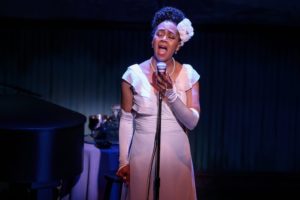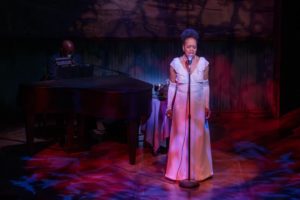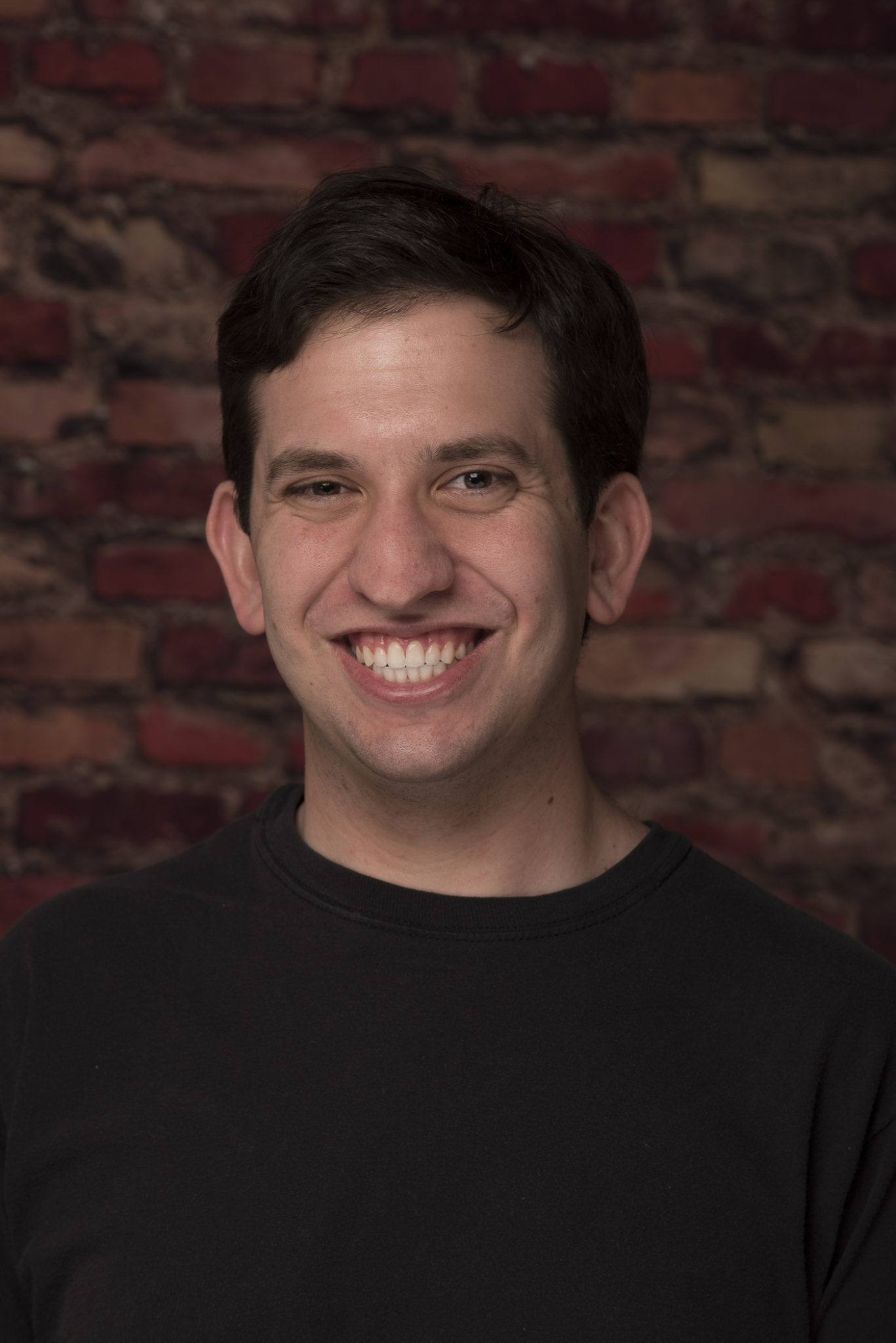Haunting Jazz and Struggles in Cygnet’s Wonderful ‘Lady Day’

Karole Foreman (photos courtesy of Karli Cadel Photography).
Her internal and external conflicts are memorably explored in Cygnet Theatre’s, in association with Ebony Repertory Theatre’s, production of Lady Day at Emerson’s Bar & Grill.
Set in 1959 at a seedy Philadelphia bar, Billie (Karole Foreman) begrudgingly puts on a performance accompanied by her pianist, Jimmy Powers (Damon Carter). In between songs such as “God Bless the Child” and “Strange Fruit,” she shares short stories about herself with the audience. As the event progresses, Billie’s addictions continue to negatively affect her health.
Lanie Robertson’s writing creates a deeply layered tale that spends just as much time celebrating Billie’s music, as it does with the dark issues she faced. He sprinkles moments of levity and pathos to make the artist one that theatregoers become instantly connected with in the beginning of the narrative.

Damon Carter and Karole Foreman.
Wearing a beautiful dress from costume designer, Kimberly DeShazo, and a wig from Peter Herman, Foreman is both charismatic and tragic portraying “Lady Day” for the fifth time in her career. Her performance always feels genuine whether she is crooning an uplifting tune such as “Gimmie a Pigfoot,” or representing Billie’s regrets and continued hopes for her future.
Carter showcases Jimmy’s constant professionalism, even if the performance does not run as smoothly as the fictional pianist hopes. His piano playing is perfect for various melodies, and he particularly stands out in a rousing solo instrumental “Blues Break.”
Brown’s meticulous direction and Foreman’s empathetic acting and incredible singing contribute highly to a bittersweet evening of theatre. Due to their collaboration, Lady Day manages to be a warts and all depiction of an unforgettable singer, and a moving celebration of her timeless music.
[box] Show times are Wednesdays at 7:00 pm, Thursdays at 7:00 pm, Fridays at 7:00 pm, Saturdays at 2:00 pm and 7:00 pm, and Sundays at 2:00 pm. [/box]

A fan of theatre from a young age, David Dixon began writing reviews while in middle school, for Union Tribune’s Rated G column and sdcnn.com. He was the Entertainment Editor for SDSU’s The Daily Aztec. Currently, he contributes to San Diego Community News Network, a regional reviewer for Talkin’ Broadway, an interviewer for San Diego Theatre Reviews and has won several San Diego Press Club Excellence in Journalism Awards. David is a San Diego Theatre Critics Circle member, an American Theatre Critics Association member & Regional Theatre Tony Award voter.



I agree that this well-directed Cygnet production features two excellent actors who give a compelling performance of Billie Holiday’s music. But Evan Eason’s sound design is seriously flawed. The review inadvertently points out the flaw by describing the setting as a “jazz concert.” It is not a concert. The play takes place in a supper club, as such venues were called in the day, with a small stage for performers. It was likely that the singer would use a microphone, but the piano was not miked then. And even the most fluent accompanist would never drown out the singer, but rather support the singer. In this production the piano was far too loud, at times overpowering the vocal line and Karole Foreman’s subtle inflections. The problem was not the pianist Damon Carter, however. He was not playing an acoustic piano but an electronic keyboard (rather crudely disguised in a prop that vaguely looked like a grand piano) so his work was projected through the venue’s sound system, and that was Eason’s responsibility to set a proper balance. And for the record, growing up in Chicago, I attended supper clubs with my parents in the late 1950s and have clear memories of those experiences.